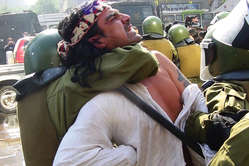 |
| Mapuche protests are often met with a violent police response |
Although the Mapuche were only conquered in the 19th century after many years of resistance, most of their lands have since been confiscated by logging companies and wealthy farmers.
Several days ago four Chilean MPs who were visiting the strikers in jail announced that they were themselves joining the hunger strike.
The decision to prosecute the Mapuche under Chile’s strict anti-terror laws means that they can be detained indefinitely; tried in military courts; and receive far harsher sentences than would be the case in a civilian court.
In a belated response to the hunger strike, Chile’s President Piñera has proposed some modifications to the anti-terror legislation. The Mapuche, however, charge that these changes were planned anyway, and there is widespread suspicion that the government’s real motivation is to concede just enough to end the protest before Chile celebrates its Bicentennial on September 18th.
Chile ratified the key law on indigenous peoples, ILO Convention 169, two years ago, but has made little progress in implementing its provisions.





 About 30 anarchists with helmets and hoods went into the supermarketnear the university of Saloniki and destroyed the security system! They took the foodstuff from the shelves and also took the moneyfrom the cash desk and burnt it outside the supermarket!nobody arrested!!
About 30 anarchists with helmets and hoods went into the supermarketnear the university of Saloniki and destroyed the security system! They took the foodstuff from the shelves and also took the moneyfrom the cash desk and burnt it outside the supermarket!nobody arrested!!
No comments:
Post a Comment